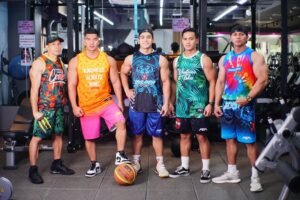USA’s Leading Eco-Friendly Clothing Manufacturer | Green Apparel Production

Eco-friendly clothing manufacturers prioritize the use of sustainable materials in their production processes. These materials include organic cotton, hemp, bamboo, recycled polyester, and Tencel, among others. Organic cotton, for instance, is grown without the use of synthetic pesticides or fertilizers, reducing harm to the environment and farmers’ health. Similarly, fabrics like Tencel are made from sustainably sourced wood pulp, processed in a closed-loop system that minimizes waste and chemical usage. By opting for these materials, eco-friendly clothing manufacturers reduce their environmental impact and promote the sustainable use of resources.
What Makes A Clothing Manufacturer Eco-Friendly?
Ethical Manufacturing Processes
In addition to using sustainable materials, eco-friendly clothing manufacturers also prioritize ethical manufacturing processes. This includes ensuring fair wages and safe working conditions for workers throughout the supply chain. Many eco-friendly brands partner with factories that adhere to international labor standards and undergo regular audits to uphold ethical practices. By prioritizing the well-being of workers, these manufacturers contribute to a more socially responsible and equitable fashion industry.
Reduced Carbon Footprint
Another key aspect of eco-friendly clothing manufacturing is minimizing the carbon footprint associated with production and distribution. This involves implementing energy-efficient practices, reducing waste, and optimizing transportation methods. For example, some manufacturers invest in renewable energy sources like solar or wind power to power their facilities, reducing reliance on fossil fuels. Additionally, adopting lean manufacturing principles helps minimize waste and improve efficiency, further reducing environmental impact.
Certifications And Standards
Many eco-friendly clothing manufacturers obtain certifications and adhere to industry standards to validate their sustainable practices. Certifications such as Global Organic Textile Standard (GOTS), OEKO-TEX Standard 100, and Fair Trade Certification provide consumers with assurance that the products they’re purchasing meet specific environmental and social criteria. By obtaining these certifications, eco-friendly clothing manufacturers demonstrate their commitment to transparency and accountability in their operations, fostering trust and credibility among consumers.
The Benefits Of Choosing Eco-Friendly Clothing
Environmental Benefits
Choosing eco-friendly clothing offers numerous environmental benefits. By opting for garments made from sustainable materials and produced using eco-friendly processes, consumers can help reduce pollution, conserve water and energy, and minimize the depletion of natural resources. Additionally, eco-friendly clothing often biodegrades more readily than conventional clothing, reducing landfill waste and its associated environmental impact.
Health Benefits For Consumers
Eco-friendly clothing is typically free from harmful chemicals and toxins commonly found in conventional clothing manufacturing. For example, organic cotton is grown without the use of synthetic pesticides and fertilizers, reducing exposure to potentially harmful residues. Similarly, eco-friendly dyes and finishes are often non-toxic and biodegradable, minimizing health risks for both consumers and workers involved in the production process.
Social And Ethical Benefits
Supporting eco-friendly clothing manufacturers also promotes social and ethical benefits. These companies often prioritize fair labor practices, ensuring that workers receive fair wages and operate in safe working conditions. By choosing eco-friendly brands, consumers can contribute to the well-being of workers in the fashion supply chain, supporting sustainable livelihoods and fostering social equity.
Economic Benefits For The Industry
The growing demand for eco-friendly clothing presents economic opportunities for the fashion industry. As consumers increasingly prioritize sustainability and ethical considerations in their purchasing decisions, eco-friendly brands can gain a competitive advantage in the market. This shift towards sustainability also encourages innovation and investment in eco-friendly technologies and practices, driving economic growth and job creation in the sustainable fashion sector.
Eco-Friendly Clothing Manufacturers In The USA
Overview, Eco-Friendly Practices, Notable Products
Company A is a leading Eco-Friendly Clothing Manufacturer USA, known for its commitment to sustainability and ethical practices. The company sources organic and recycled materials for its garments and partners with certified factories that uphold fair labor standards. Their product range includes organic cotton t-shirts, recycled polyester activewear, and bamboo-based loungewear, among others.
Overview, Eco-Friendly Practices, Notable Products
Company B specializes in eco-friendly denim manufacturing, using innovative techniques to reduce water usage and minimize environmental impact. They prioritize the use of organic cotton and recycled denim fabrics in their jeans, and their production processes are certified by leading sustainability standards. Company B’s signature products include eco-friendly jeans made from recycled materials and dyed using natural, non-toxic dyes.
Overview, Eco-Friendly Practices, Notable Products
Company C is renowned for its eco-friendly outerwear and outdoor apparel, designed for adventurers who value sustainability. They utilize recycled materials and eco-friendly insulation in their jackets and coats, reducing waste and carbon emissions. Company C’s commitment to sustainability extends to their packaging and shipping practices, minimizing the environmental footprint of their products from production to delivery.
Challenges And Solutions In Eco-Friendly Clothing Manufacturing
Cost Challenges
One of the primary challenges in eco-friendly clothing manufacturing is the higher cost associated with sustainable materials and ethical practices. However, as demand for eco-friendly clothing grows and economies of scale are achieved, the cost gap between conventional and sustainable products is expected to narrow. Additionally, government incentives and subsidies for sustainable initiatives can help alleviate cost challenges for manufacturers.
Sourcing Sustainable Materials
Another challenge is sourcing sustainable materials at scale, especially for niche or specialized fabrics. Manufacturers may face limitations in the availability and consistency of sustainable materials, as well as challenges related to supply chain transparency and traceability. Collaborative efforts within the industry, such as partnerships with sustainable material suppliers and investment in research and development, can help overcome these challenges.
Scaling Up Eco-Friendly Production
Scaling up eco-friendly production while maintaining sustainability standards poses logistical and operational challenges for manufacturers. This includes ensuring that increased production volumes do not compromise ethical labor practices or environmental commitments. Implementing efficient production processes, investing in technology and infrastructure, and collaborating with industry stakeholders can facilitate the scalability of eco-friendly manufacturing operations.
Consumer Education And Awareness
A key challenge in promoting eco-friendly clothing is consumer education and awareness. Many consumers are unaware of the environmental and social impact of their clothing choices or lack understanding of how to identify eco-friendly products. Manufacturers can address this challenge through transparent labeling, educational campaigns, and partnerships with sustainability advocates to raise awareness and empower consumers to make informed purchasing decisions.
Tips For Consumers
How To Identify Eco-Friendly Clothing
When shopping for eco-friendly clothing, look for certifications such as GOTS, OEKO-TEX, or Fair Trade, which indicate that the product meets specific sustainability and ethical standards. Additionally, consider the materials used in the garment and opt for organic, recycled, or renewable fibers whenever possible. Look for brands that prioritize transparency and provide information about their sourcing and manufacturing practices.
Shopping Tips For Supporting Eco-Friendly Brands
Support eco-friendly brands that align with your values and priorities, whether it’s environmental sustainability, fair labor practices, or animal welfare. Research brands’ sustainability initiatives, read customer reviews, and consider factors such as durability and longevity when making purchasing decisions. By supporting eco-friendly brands, you can vote with your dollars and drive positive change in the fashion industry.
Ways To Extend The Lifespan Of Clothing
To minimize waste and maximize the sustainability of your wardrobe, adopt practices that extend the lifespan of your clothing. This includes proper care and maintenance, such as washing garments in cold water, air-drying instead of using a dryer, and repairing or repurposing items when they show signs of wear. Consider investing in timeless, high-quality pieces that withstand trends and frequent wear, reducing.
Conclusion:
Eco-friendly clothing manufacturers in the USA are leading the charge towards a more sustainable and ethical fashion industry. By utilizing sustainable materials, ensuring ethical manufacturing processes, and striving to reduce their carbon footprint, these companies are making a significant positive impact on the environment and society. Consumers who choose eco-friendly clothing not only benefit from higher-quality, non-toxic garments but also contribute to the well-being of workers and the planet.








